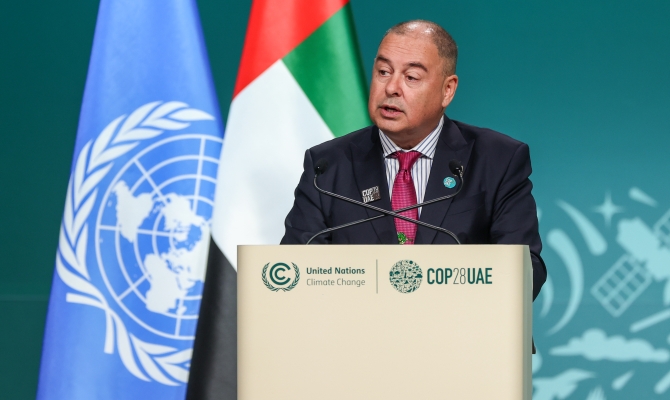Wednesday 6 December 2023 | Written by Supplied | Published in Environment, National

Prime Minister Mark Brown called upon world leaders at the 28th Conference of the Parties to the UN Climate Change Convention in Dubai to consider those on the frontlines of an environmental war ‘we did not initiate’. SPREP/23120502
Collectively the Pacific Islands region contributes to less than 0.03 per cent of the world’s total greenhouse gas emissions yet are amongst the most vulnerable on the frontlines of the impacts that climate change bring.
Speaking before world leaders during the High-Level Segment of the 28th Conference of the Parties to the UN Framework Convention on Climate Change (UNFCCC COP28) on Saturday, Brown said: “Ask ourselves – what if this were my home? What if this were my family? How would you act? The Pacific, constantly under siege from sea-level rise and extreme weather events, is a testament to the global implications of climate inaction.”
“Respect, commitment and shared humanity must be the cornerstones of our actions, propelling us towards a successful outcome at COP28.”
In a statement, the South Pacific Regional Environment Programme (SPREP) said the first Global Stocktake is a pivotal moment for COP28 as this comprehensive assessment of progress since adopting the Paris Agreement, highlighting just how much more works needs to be done to move our planet back on the journey to achieve the 1.5-degree global warming temperature limit.
“The blunt findings of the 6th Intergovernmental Panel on Climate Change Assessment Report are grim – our present efforts fall drastically short of meeting the Paris Agreement goals. Climate change is not a looming threat; it's our daily reality in the Pacific. We still have a chance to limit global warming to 1.5°C, but only through immediate, decisive action,” Brown said.
The Prime Minister also called upon the global community to fulfil its financial climate change commitments saying this is overdue.
“In 2022 last year, the International Monetary Fund reported that $7 trillion was spent on fossil fuel subsidies, yet the global commitment of $100 billion per year to the Paris Agreement continues to struggle for fulfilment. A mere reallocation of $1.50 from every 100 spent on fossil fuel subsidies could easily finance this commitment,” said Brown.
“In today’s economic climate, the previously agreed upon $100 billion per year is now merely a starting point. To effectively alter our current trajectory, the need for enhanced support is not just immediate, but overdue.”
Brown also stressed the importance of reforming international financial institutions to support accessible climate finance without exacerbating debt.
He noted the efforts by the Asian Development Bank for initiating new finance modalities offering more accessible terms for high-income countries like the Cook Islands.
“Small Islands Developing States like the Cook Islands did not create this climate disaster. We shouldn’t have to pay the heavy price for protecting ourselves from its impacts. Simplifying access to climate finance Is imperative for swift and effective action to address climate change impacts.”
Brown also highlighted the Pacific Resilience Facility, launched under the Pacific Partnerships for Prosperity at the 52nd Pacific Islands Forum Leaders Meeting hosted in the Cook Islands in November.
Seed funding to help kickstart the fund has been contributed from the Government of Saudi Arabia, United States, the People’s Republic of China, and Australia. He called on the remaining G20 nations to join their fellow members in contributing to the Pacific Resilience Facility.
“Our actions today will determine the legacy we leave for future generations, and the Cook Islands is ready to unite, act and deliver on our collective mission here at COP28.”
The COP28, attended by Pacific leaders and their delegations, who are advocating for the survival of Pacific communities at the forefront of climate change impacts, ends on December 12.